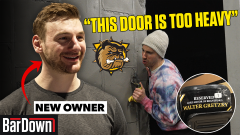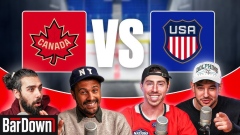For a long time, people felt as though the Toronto sports were attached to a culture of losing, but looking at recent history, MLSE has built a city of teams that people can believe in.
The Toronto Raptors are the team on top of everyone’s mind because they’re currently on top of the basketball world, but the recent journey has been one of consistent competitiveness through investing in their facilities and front office.
Christopher Overholt, the President and CEO of OverActive Media, used to work at MLSE and it appears as if he learned a lot from his time there. He is now trying to build another MLSE style business in the world of eSports. OverActive Media is the company behind Toronto’s first ever city-based eSports team, Toronto Defiant, and it has been announced that they will do the same with a Call of Duty team. Defiant launched their franchise in February, playing in the Overwatch League which is in it's second season. They also have a League of Legends team, but they don't currently have anything city based for that game.
Overholt is not shy in sharing where the inspiration has come from.
”The business model that we’re using is pretty much apropos with my experience in that industry. We tell our marketing partners and our investors every day that we’re building the Maple Leaf Sports or the Madison Square Garden Company in the world of eSports.”
As you can see in the full interview below, there is a lot more in their strategy that links them to MLSE. Hopefully for them, they will be able to build a winning culture like MLSE has done with their Toronto teams.
BarDown Staff: With OverActive Media and Bell announcing their partnership, what does this mean for the future of the company?
Christopher Overholt: First of all, we couldn’t be more excited or be in a better position than to be welcoming Bell as our first founding partner. I think it has the effect of signaling to the industry, not just here in Canada, but globally, that significant investors and marketing partners like Bell take this industry very seriously and see it as strategic.
It’s not only great for us, who get to establish the corporate partnership market here in Canada, but again on behalf of us and Bell, I think it’s global industry news and should signal to anybody that’s looking in on it that this industry isn’t just evolving, it’s arrived.
BD: It has definitely arrived. Have you been surprised by some of the early reception to Toronto Defiant, with lineups around the block for the launch party and a sellout for the first viewing party at Real Sports?
Christopher: Well, I would have to say I didn’t really know what to expect at all. I had spent a couple of years looking into the industry and seeing some of those positive trends. I saw the potential in it, but I don’t think any of us could realistically say we could have expected any of this in the context of our Toronto market and how people would respond to the Toronto Defiant brand or even how they would respond and support the Overwatch league.
What I can tell you, is that we’ve been able to build momentum off of all this and find opportunities across the globe.
I’ve just come back from two weeks on the road. Los Angeles, Miami, Madrid, London and I can’t tell you – every conversation that we’re in whether it be with a marketing partner or an investor or a production partner, it doesn’t matter where it is, there is potential in this industry that is hard to even evaluate right now.
I think we’re really quite surprised by the global scale.
We have 15 teams playing in seven countries. Maybe as importantly, we also play the three most important leagues in the world. We’ve built an incredible team and we haven’t even announced everyone yet.
You’ve worked in traditional sports in the past and even in Toronto with MLSE. How has that background translated to the world of eSports?
It’s been very relevant. In fact, the business model that we’re using is pretty much apropos with my experience in that industry. We tell our marketing partners and our investors every day that we’re building the Maple Leaf Sports or the Madison Square Garden Company in the world of eSports.
We’re owning brands and teams that play in the biggest leagues in the world, we’re prolific builders of content for distribution and monetization, we’ll build out shoulder brand positions like We the North and we’re talking to developers here in Toronto about the potential for Venue development over the next several years.
That model is our model and our way forward is expressed most appropriately as analogous to Maple Leaf Sports and MSG Company. So, my experience there has certainly been contextually relevant and helpful.
How much has the launch of the Toronto Defiant helped in your preparation for a city-based Call of Duty team?
It definitely helps that we already have a great relationship with the Activision/Blizzard team, so that has definitely helped. Y’know, both of our teams will be playing in the Toronto market early next year. January or February of next year is when we’re going to get rolling on this, and eSports in that moment is going to become real for all of the Toronto community and for the fans and we’ve got some exciting announcements to come in terms of our venues and other things like that.
It’s certainly wonderful to have a partner like Activision/Blizzard to be doing this with.
For player acquisition, will that be similar to the Overwatch League? Will there be kind of Minor League teams or Academy Teams?
Yea. We will eventually, maybe not in the first year. We’re working on our player strategy now. Marty Strenczewilk, our SVP of performance, Marty’s been talking to me about where he sees the player market going and some key areas where we may be able to make some acquisitions this year. So, in the context of Call of Duty, there a couple of big open tournaments that we’re excited to maybe test out some new strategy and some new players as we get ready for next year.
But we apply the same kind of approach as traditional sports do on the player performance side. We have coaches, general managers, assistant coaches, chefs, therapists, analysts and team psych all supporting our group.
Like any team, the evolution of your player position and strategy is evolving virtually every day/every week. We’ve got a lot to do before next year on both the Toronto Defiant side and certainly the Call of Duty side.
How big of an eSports fan were you when you started with OverActive and how has that changed over time?
I’m a sports fan, it hardly matters what it is. As of my understanding of eSports generally, it’s evolving.
When I took this on, I had watched a bit of it as a became interested in Overwatch a couple of years ago. I was certainly looking in on all the different games and was blown away by all the different audiences it was attracting.
Of course, since we’ve been in the business, on Fridays our League of Legends team typically plays and we’ve been all taking time to watch our team play and learn the game bit more. I’ve been taking time with Marty and others who have been educating me around strategy and the rules. This past week I was in Madrid at an event called Gamer G where I’ve watched our team compete in a match in front of a 2,500 seat audience in Madrid. So I’m getting a lot of eSports right now and I’m learning more and more as I go.
Still, I would concede to you that I still have a lot to learn.
Well you’re attending all these events and you’re seeing all these top of the line gaming set ups, has it made you want your own? Do you have your own game room?
Yea, I’ve got a console at home, but nothing compared to what these guys are playing with. I spend a little bit of time every week as I have it. I’ve been playing around with some different games, I’ve have my older son come over and spend some time teaching me Call of Duty and Fortnite and I’ve been playing a little bit of Overwatch on my own.
It’s like anything else in life, you have to be patient with it and take your time. But, we’re going to watch the audience grow around eSports and competitive video gaming in general.
But that’s the thing, kids are playing these games already. If you’re a fan of Overwatch today and you’re a 15-year-old boy or girl or your playing Call of Duty as a university student, it’s quite likely that when you’re 30 or 40 that passion for that game and for eSports around those games will not waiver.
So, if you believe in this global audience in the way that we do, if you believe in the way that it scales and in the emotional connection that exists around these titles, then the advent of eSports as a live event and the audience that will grow and continue to evolve as they get older is really quite mind blowing.
I think we’ll only watch the eSports audience grow in leaps and bounds over the next decade.
That is every bit our opportunity as OverActive Media and that is every bit Bell’s opportunity as our founding partner to have real first mover advantage in all of that.
We’ve been doing fan segmentation research and one of the numbers that for the average ages of the audiences surprises me is that there is a strong representation from 18-25, but for some titles, ones that have been around a little longer like Starcraft, they can stretch up to 30. So, passion is passion and what we’re watching in eSports is the definition of what it means to be an athlete and it’s pretty exciting to be a part of.
One last question, we know a lot went into the decision to name the Overwatch team Toronto Defiant and we know you probably won’t give us the name of the new Call of Duty team, but are there any names that you’ve considered and already ruled out?
Soon. We’re not quite there yet. We’re very much in the middle of that process, with focus groups, fan research and we’ll have more of a story to tell when we get ready to launch the team properly and we’ll announce the name, the story behind the name and the venue that we’re going to be playing in. There’s certainly more to come in the next few weeks and months, so stay tuned!
Okay, thanks Chris and good luck this season!




